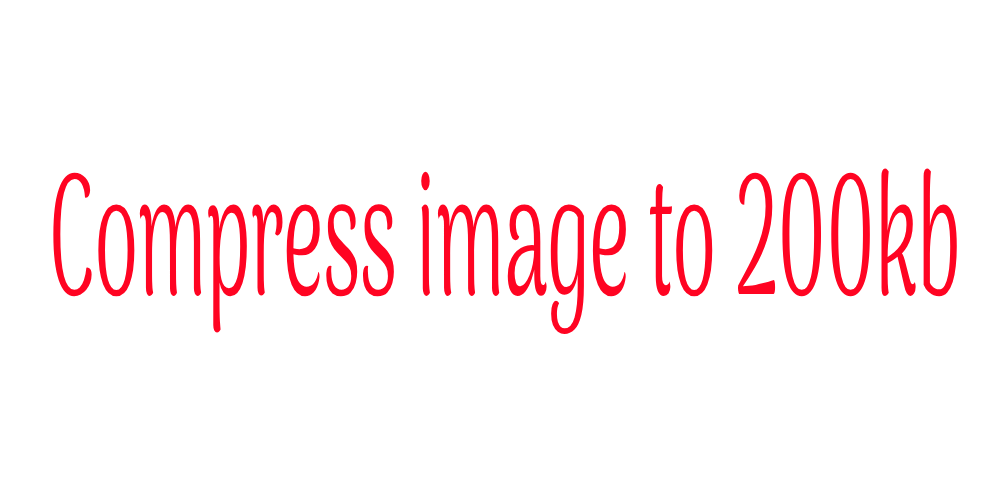Compress image to 200kb online without losing quality.

Compress image to 200kb
- Online image compressor up to 200kb width and height
- Click on Upload Image, and uploading will begin.
- PNG images are automatically converted to JPG and a JPG image download link is provided.
- Click "Download JPG Images" to download compressed images for free.
How can I convert PNG to JPG for free?
- Upload any PNG format image you want to transform into JPG.
- Click on on add picture and the uploading will begin.
- The PNG format picture will automatically convert to JPG layout and a JPG format image down load link can be supplied.
- Click on "Download Picture in JPG" to download your converted picture without spending a dime.
Compress Image to 200KB
Introduction to Image Compression
Image compression is the process of reducing the file size of an image without significantly affecting its quality. This is important for various reasons, including reducing storage space, improving website loading times, and minimizing bandwidth usage. Compressing images efficiently ensures faster load times, better user experience, and improved SEO performance.
Why Compress Images to 200KB?
Compressing images to a specific size, such as 200KB, is often necessary for various purposes. Whether you're optimizing images for a website, email attachment, or social media post, adhering to size limitations ensures compatibility and faster loading times. Additionally, smaller image sizes are crucial for mobile responsiveness and accessibility.
Methods to Compress Images
There are several methods available for compressing images, each with its own set of advantages and limitations. Common techniques include lossy compression, which sacrifices some image quality for smaller file sizes, and lossless compression, which maintains image quality while reducing file size. Other methods include resizing images, removing metadata, and converting file formats.
Online Tools for Image Compression
Numerous online tools make image compression quick and easy. Websites like TinyPNG, JPEG Optimizer, and Compressor.io allow users to upload images and compress them to their desired size. These tools often provide previews of compressed images and allow users to adjust compression settings to achieve the desired balance between file size and quality.
Software for Image Compression
In addition to online tools, various software options are available for image compression. Programs like Adobe Photoshop, GIMP, and Adobe Lightroom offer advanced features for optimizing images. Users can manually adjust compression settings, resize images, and batch process multiple files for efficient optimization.
Tips for Effective Image Compression
To achieve optimal results when compressing images, it's essential to follow best practices. This includes selecting the appropriate compression method based on the image content, resizing images to the correct dimensions, and minimizing unnecessary details. Additionally, avoiding excessive compression and preserving essential image elements ensures that the final result maintains visual integrity.
Optimizing Images for Web
Optimizing images for web use is crucial for improving website performance and user experience. This involves not only compressing images but also considering factors such as file formats, alt text, and image dimensions. By optimizing images for web delivery, businesses can enhance their online presence, boost SEO rankings, and attract more visitors to their websites.
Image Compression Plugins for Websites
For website owners using content management systems like WordPress or Shopify, various plugins are available to streamline the image compression process. Plugins such as Smush, ShortPixel, and Imagify integrate directly with these platforms, allowing users to automatically compress images upon upload. This simplifies the optimization process and ensures consistent image quality across the website.
Testing Image Compression
After compressing images, it's essential to test the results to ensure that the desired balance between file size and quality has been achieved. Tools like PageSpeed Insights, GTmetrix, and Pingdom provide insights into website performance, including image optimization. By regularly testing image compression, website owners can identify areas for improvement and maintain optimal loading times.
Conclusion
Compressing images to 200KB is essential for optimizing website performance, reducing bandwidth usage, and improving user experience. By utilizing online tools, software, and best practices, businesses can effectively reduce image file sizes without sacrificing quality. Whether you're a website owner, blogger, or social media marketer, mastering image compression techniques is crucial for achieving optimal results in today's digital landscape.